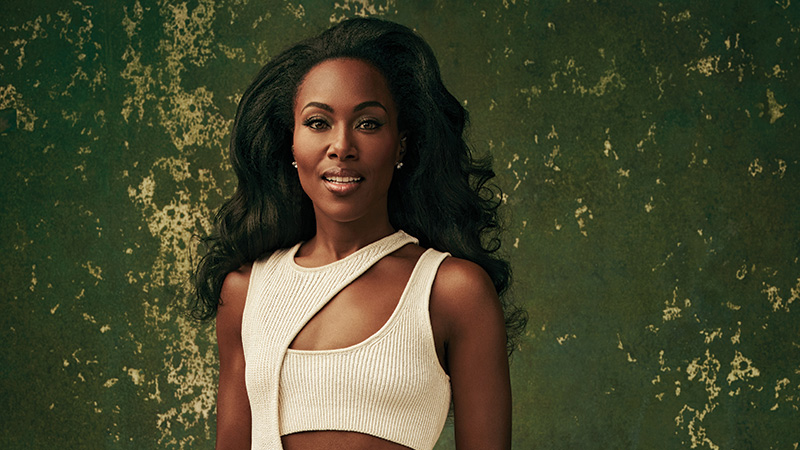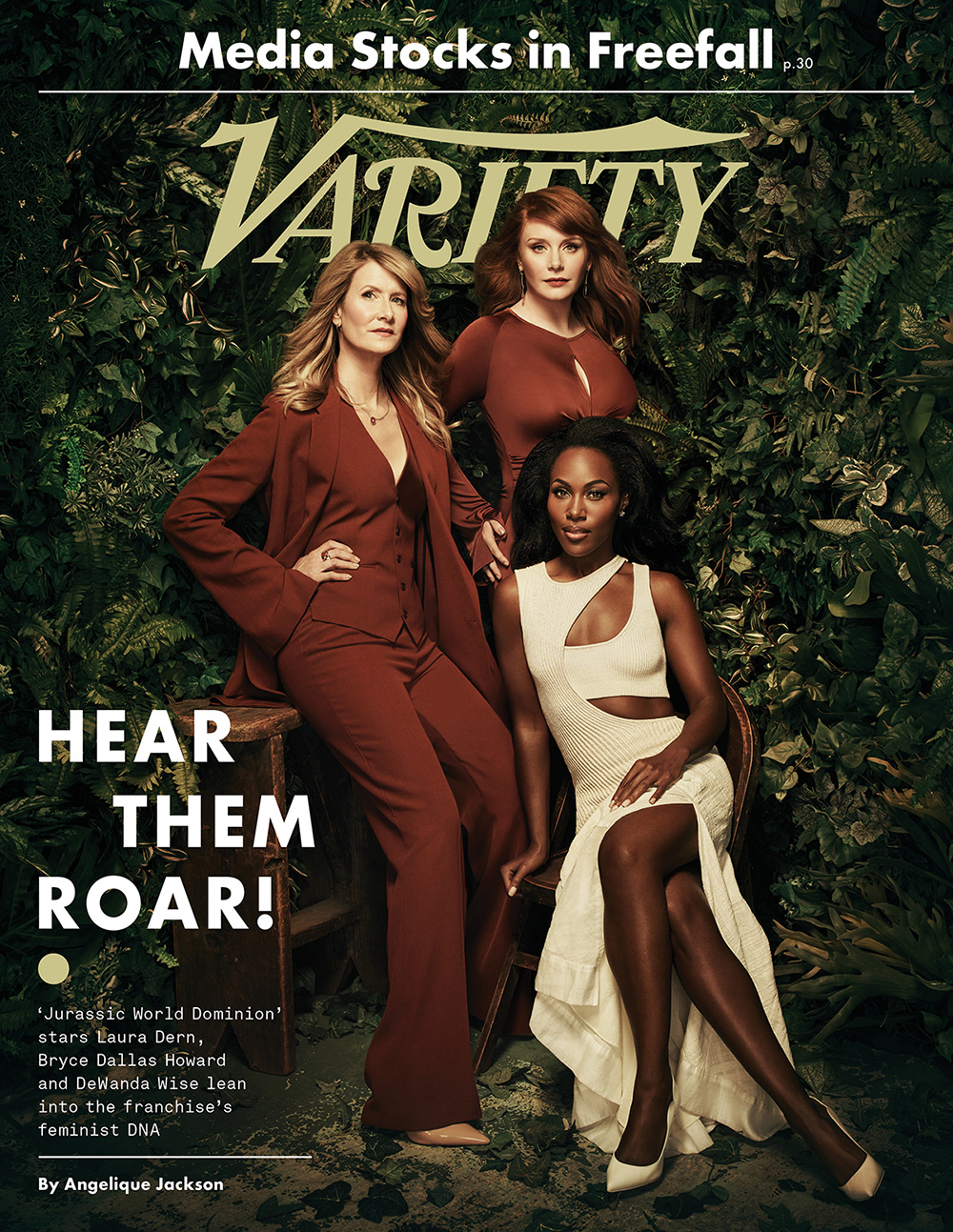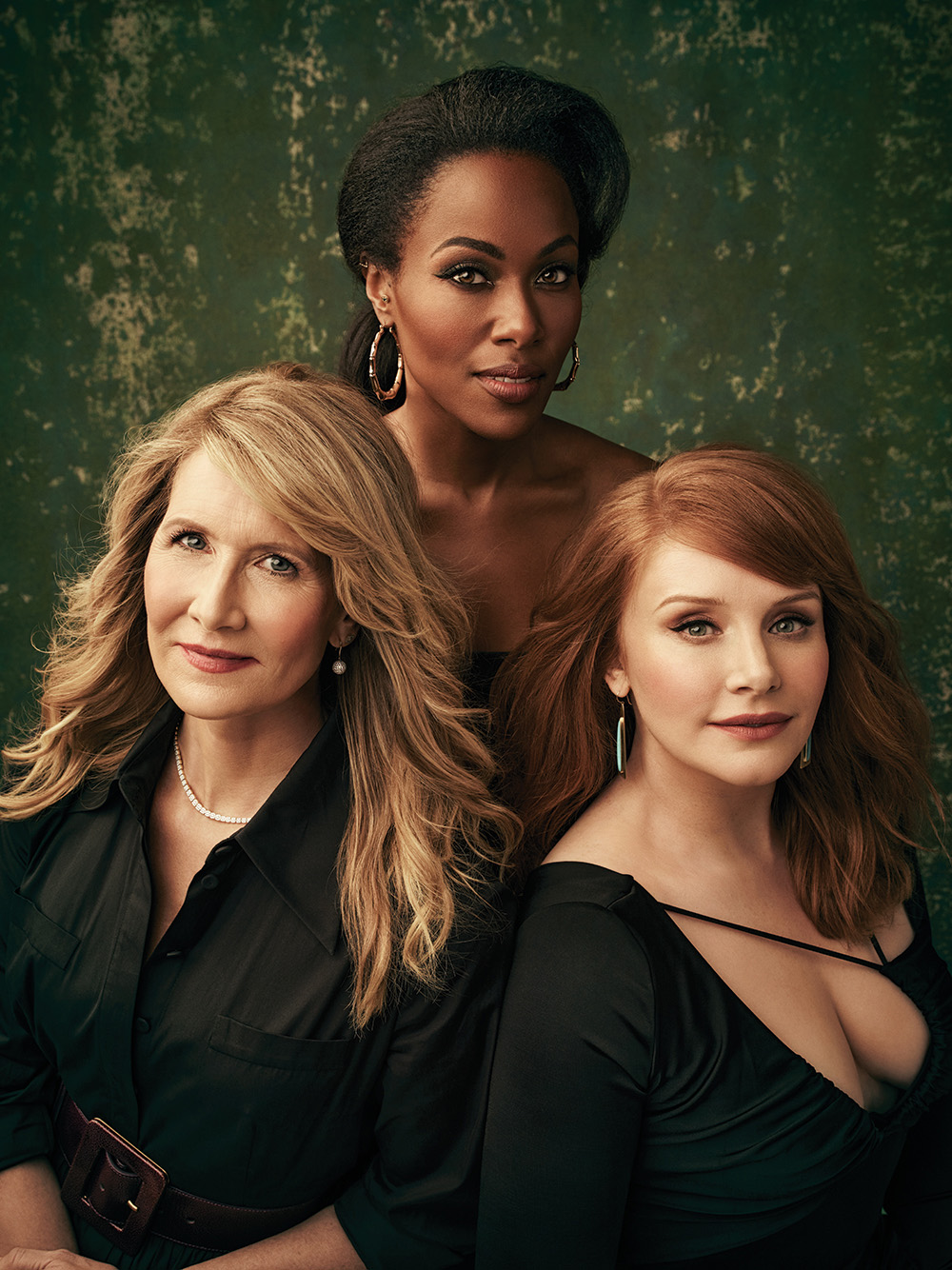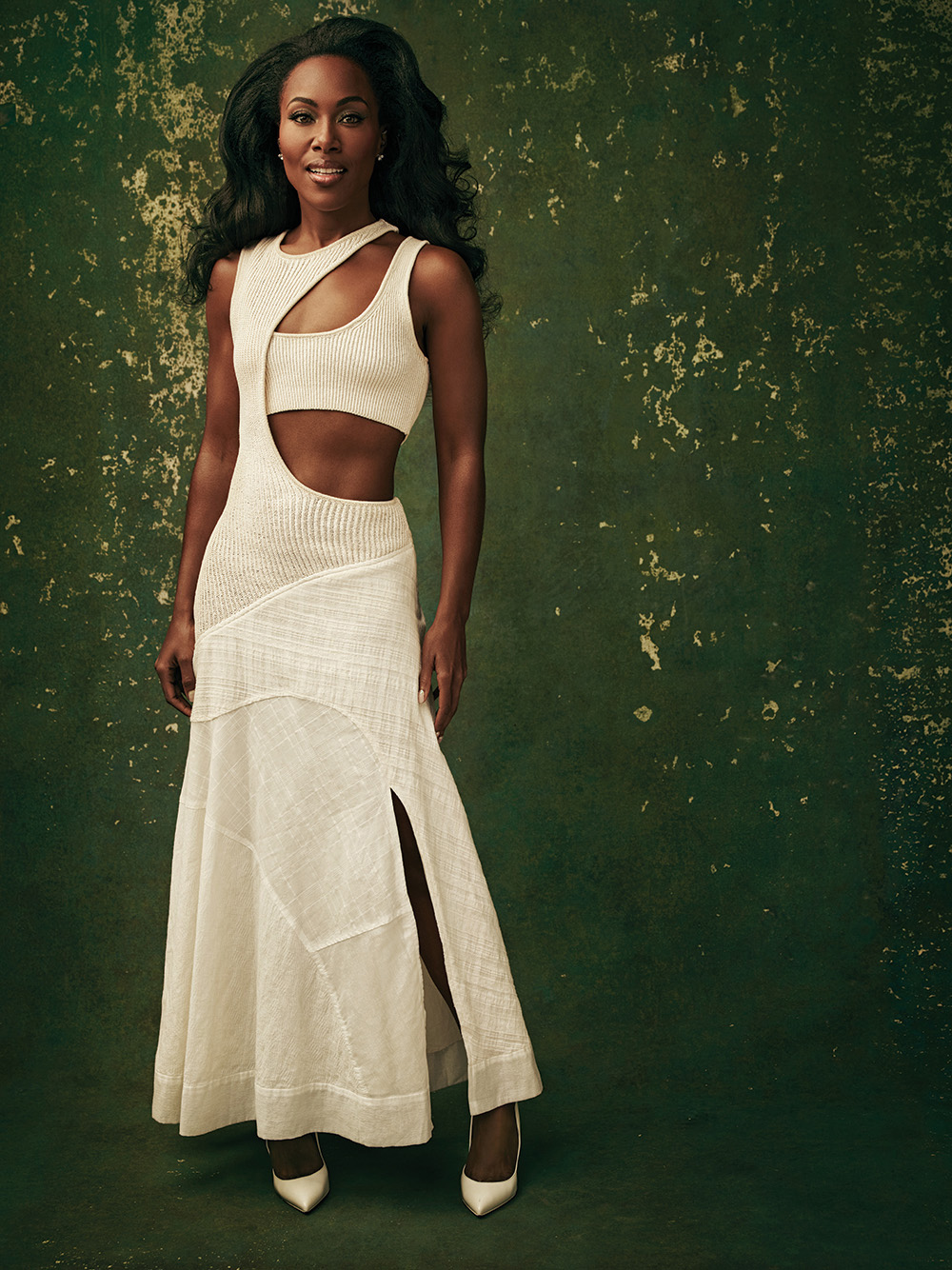
Bryce Dallas Howard and DeWanda Wise Became Summer’s Breakout Action Stars
ByAngelique Jackson
Photographs by Art Streiber
“Dinosaurs eat man. Woman inherits the earth.”
That quip from Laura Dern’s Dr. Ellie Sattler in 1993’s “Jurassic Park” has been immortalized on T-shirts, bumper stickers and coffee mugs ever since the first film in the mega-billion-dollar dinosaur franchise debuted in theaters. But that piece of sexual politics wasn’t in the original script.
“God bless everyone involved who allowed this to be in a movie,” Dern says, reflecting on the scene. “Because that’s what it felt like at that time. I felt like we got away with something.”
A lot has changed in the ensuing three decades, but that line still roars. And it’s a piece of dialogue that has become a central strand in “Jurassic’s” DNA. Because, after all, it’s not just men who enjoy watching a T. rex feast on parkgoers; women dig dinosaurs too. In a sign of the cross-gender appeal, the U.S. audience for 2018’s “Jurassic World: Fallen Kingdom” was split nearly evenly between men and women.
The sixth film in the series, “Jurassic World Dominion,” debuts June 10, and of all the movies in the franchise, it is the installment most firmly committed to that feminist creed. Dern makes her long-awaited return as Ellie, and this time she’s flanked by Bryce Dallas Howard, who carried the pro-woman torch starring as Claire Dearing in 2015’s “Jurassic World” and its direct sequel, “Fallen Kingdom,” as well as by DeWanda Wise, who picks up the baton as pilot Kayla Watts.
“It was very important to introduce a new hero who could potentially define the future of this franchise,” director Colin Trevorrow says of Wise’s character. “We’ve had the opportunity to hopefully make someone that young girls are going to be dressing up as at Halloween for years to come.”
The “Jurassic” movies mark an inflection point in each woman’s filmography: Dern was already an indie starlet and Oscar nominee when she met her first triceratops, but the film opened a path to blockbusters. Howard has taken her “Jurassic” cachet and become one of the industry’s most impressive directors, helming episodes of “The Mandalorian” and the upcoming remake of “Flight of the Navigator.” Wise, with nearly 20 years in the business and Spike Lee’s “She’s Gotta Have It” reboot under her belt, is ready for her star turn.
On a Saturday afternoon in March, the trio have assembled for their Variety cover shoot, and it’s not a stretch to say that the multigenerational strength on display represents a new era for the entertainment industry, one in which women have seized their opportunity to exhibit more dominion over their place in it. And to think, it all started with that iconic bit of dialogue, a tart observation that wouldn’t have existed without Dern.
“You delivered the shit out of that line,” Howard chimes in, not allowing Dern to be too humble.

Uttered in response to Jeff Goldblum’s Dr. Ian Malcolm sharing his philosophical take on scientists resurrecting dinosaurs for the titular park — “God creates dinosaurs. God destroys dinosaurs. God creates man. Man destroys God. Man creates dinosaurs” — part of the magic is how Dern maintains her focus, staring straight ahead at the T. rex paddock just outside the window of their Jeep. It’s also the look on the faces of Goldblum and Sam Neill (Dr. Alan Grant) as they slowly turn toward her, catching on to what she’s said. To quote another famous line from the movie: “Clever girl.”
From the start, Dern worked with “Jurassic Park” screenwriter David Koepp, director Steven Spielberg and producer Kathleen Kennedy to ensure that Ellie had a definitive perspective on the world she was inhabiting — and that she expressed it. However, Dern is slightly more partial to another line: “We can discuss sexism in survival situations when I get back.”
“It’s just so perfect, because we get to repeat some of that energy — ‘We’ll take care of the business’ — while there may be boys shirtless in the scene,” Dern comments, as the trio laugh about the meme-able memory of Goldblum reclining after his run-in with the T. rex, with his collared shirt splayed wide open to reveal a well-manicured chest.
“It was so enjoyable to me. She’s like, ‘I’ll be over here taking care of stuff; you just rest yourself,’” Dern adds, as Howard jokes: “You look injured, and all oiled up.”
According to Kennedy, Dern is more responsible for those slyly feminist moments than she’ll admit. The filmmakers were looking for someone who “had strength and agency, was independent, willful and able to confidently say a line like that,” Kennedy explains. “[Ellie] was this incredible paleobotanist who didn’t need to be protected.”

Once Dern was on board, the two women collaborated to ensure audiences experienced Ellie as a three-dimensional person, making choices about her look that leaned toward the practical, not the pinup, including putting the character in shorts and hiking boots and giving her an updo. Then, Dern worked with Koepp to weave those traits into her dialogue, and with six words an icon was born.
“We all instantly loved it,” Kennedy recalls. “Her character saying something like that was somewhat unique at the time. It was very cutting edge and new; although, thankfully, we’re seeing more and more characters like that now.”
When “Jurassic World Dominion” co-screenwriter Emily Carmichael watched “Jurassic Park” as an 11-year-old, she was influenced by Ellie Sattler’s scientific prowess, but that loaded dialogue flew over her head. “The fact that that character, in that environment, needs to drop this little bomb into the lap of the patriarchy, I understand that better as a more mature female,” she says.
It’s no surprise that preteens like Carmichael weren’t particularly hip to the gender dynamics; they were more focused on the velociraptors. But Hollywood was also a different place in 1993. Female action stars were few and far between, with Sigourney Weaver’s Ripley in “Alien” and Linda Hamilton’s Sarah Connor in “Terminator 2: Judgment Day” as some of the few sterling examples. The paleobotanist is certainly a different kind of heroine than those gunslingers, but she’s still badass. As such, Ellie laid the groundwork for the “Jurassic” women who’ve followed — who are as compassionate as they are capable; desirable yet never the “sexy scientist” trope; and, above all, quick-witted, clever and not afraid to get up to their elbows in dinosaur dung.
But as the franchise continued to evolve, there was one major hiccup in its progress: Whereas Neill and Goldblum each fronted another movie, Dern’s character never got a sequel (save for her cameo in 2001’s “Jurassic Park III”). This time, Ellie returns for an adventure that requires the skills of someone whose knowledge of plants from different periods in Earth’s history would be useful in diagnosing the state of the environment today. Explains Trevorrow: “We made sure to make her the engine of the story, so all three of them could have that as part of their legacy.”
At the end of the three-hour photo shoot, Howard, Dern and Wise are preparing to spend more time together, gathering for an afternoon barbecue with friends and family at Howard’s home.
But for now, they’re huddled in Wise’s dressing room and about to recount their experience filming the new dinosaur movie. Ever the director, Howard sits on one end of the couch texting Trevorrow to let him know that they’re going to be just a little bit later than expected, while Dern is at the other end and Wise perches on a chair across from them.

The women forged a deep bond while quarantining at the Langley hotel in Buckinghamshire, U.K., for nearly five months while filming amid the pandemic. The conversation takes place nearly two years to the March 2020 date when production on “Jurassic World Dominion” shut down. It was early in the schedule — Howard had filmed one of the movie’s opening sequences, while newbie Wise was on location waiting to make her Jurassic debut the following Monday — when the decision was made to send everyone home before the borders closed.
“It was scary. We were shooting on March 13, and I remember Daniela [Pineda, who plays paleo veterinarian Zia Rodriguez] was announcing, ‘OK, no more basketball. No more Broadway. Tom Hanks has it. OK, we’re shutting down,’” Howard recalls.
When the cast and crew returned in early July 2020, “Jurassic World Dominion” was Hollywood’s guinea pig — as the first big-budget movie back in production, it served as the blueprint for whether filming could safely resume. That’s not the ideal way to start a job you’d describe as “career-defining,” which is how Wise sees Kayla. And it’s even more difficult when your “resourceful and witty” character is expected to be as “laissez-faire” as Harrison Ford’s Indiana Jones.
Wise is a veteran actor, but when stepping onto set for the first time, she admits: “I had my Kayla veneer, but DeWanda was terrified.”
“I remember Chris [Pratt, who reprises his role as animal behaviorist Owen Grady] asking me — because I’m sure I was giving very newbie behavior — he was like, ‘How long have you been doing this?’ And I said, ‘20 years,’” she adds, emphasizing just how curtly she responded. “I was like, ‘I’m gonna get my bearings — just give me a moment. I’m working through multiple traumas.’”
In her earliest incarnation, Kayla wasn’t written specifically as a Black woman. It was when Trevorrow cast Wise, after seeing her in “She’s Gotta Have It,” that her identity took shape.
“She came in with a really specific portrayal,” Carmichael remarks, sharing a few things to note about Kayla: She’s an Air Force veteran with a legacy of military service; she’s from Detroit; she’s bisexual.
“It was a really dope and atypical opportunity to give her some legs to stand on,” Wise says. “I always think it shows up [on screen]; you can feel the difference between a character who’s one-dimensional and one who clearly has had an entire life before she has met any of these people.”
The director’s first question was what Wise imagined for the character’s hair; she chose braids, and the production brought in Josee Mampuya, owner of Josee’s Professional Braiding Studio in North London, to do the job. “The experience of getting them was Black womanhood at its finest,” Wise recalls. “It was — as it is — a deeply fulfilling spiritual ritual, a precious thing. It just felt like having family there with me in the process.”
It was just as imperative that Kayla’s bisexuality be clearly defined. “It’s important to continue to expand and diversify what [sexuality] looks like, what it means,” Wise explains. “It’s the same thing when you’re coming at conversations about diversity and representation in general — which is, at some point, it has to be so well-woven, so matter of fact, that you feel it in the fiber and the truth of the character.”
That’s why it was key that Kayla not fall into “strong Black woman” tropes, that would see her swooping in to save a bunch of white people she barely knows. Instead, her decision to get involved stems from her own moral code.
“What’s just dope about the franchise overall is it gives this vast representation, both of women and what the strength of women actually is,” she proclaims. “What’s really exciting, in a post-Time’s Up world, is we’re moving towards a more integrated feminism, which is vital for times such as these for obvious reasons.”
Fans got their first look at Kayla in January, when an image was released showing the character standing next to Pratt and preparing to face an unknown predator. Some wondered if the character — whose name had yet to be revealed — was Dr. Malcolm’s daughter Kelly Curtis (Vanessa Lee Chester), who was introduced in 1997’s “The Lost World: Jurassic Park.”
Trevorrow explains why he didn’t go that route. “This is a global franchise for people all around the world. Inventing new Black heroes is important,” he says, pointing out that Kayla isn’t the only Black character populating this universe. The new movie also introduces Mamoudou Athie’s Ramsay Cole, a Biosyn employee, and features the return of Omar Sy from “Jurassic World” as Owen’s fellow raptor trainer, Barry.
Wise would not have taken the role of Kelly had it been offered.
“Vanessa’s here and she’s an actor,” she says plainly. “It’s one thing to reboot a character like Nola Darling 30 years later, and another thing to be like, ‘I’m this person now.’”
Overall, the response to Kayla has been “overwhelmingly” positive. “It’s a very pure fan base,” Wise believes. “Maybe it’s the love of dinosaurs, but everyone wants to see you win. I don’t think that’s common. They’re just like, ‘We can’t wait to meet her.’”
But there have been haters. A small but vocal group of trolls criticized the casting as “woke.”
“As soon as you put a woman, a Black woman, a woman of color, or a person of color on screen, it has, to whomever, a connotation,” Wise says. “Whether they know the story yet or not, I’m inherently politicized. I know that.”
Dern also pushes back strongly on the “woke” claim.
“When I read the script, it wasn’t about color, sex or anything. It was about finding the actor who could be the next Indiana Jones. And this,” she says, pointing to Wise, “happens to be the actor.”
Howard has dealt with fan backlash of her own, when critics ridiculed Claire for wearing high heels throughout “Jurassic World.” Howard is the first to make a joke about Claire sprinting ahead of a T. rex while wearing stilettos — “Stepping into the shoes of Claire was also a little challenging because they were heeled, but nobody noticed,” she jokes. But she has long maintained that the footwear was a character choice, one of the many that defined Claire’s tightly wound persona, with her crisp suits and all-business mentality.
“To DeWanda’s point, it has everything to do with what the experience is like while you’re making the movie and how either empowered or disempowered you feel,” Howard says, reflecting on the controversy. “I always felt empowered, every single minute of ‘Jurassic,’ by Colin Trevorrow. And that experience, no comment or observation or analysis can ever take that away from me.”
As “Dominion” introduces Kayla, the film aims to conclude Claire’s arc. “We start with her in every film, and she has been the engine of each of those stories,” Trevorrow says, reinforcing that, while Pratt may receive top billing, Howard is the “Jurassic World” trilogy’s protagonist.
Over the course of three movies, the buttoned-up operations manager for the Jurassic World theme park has evolved to become a dinosaur rights activist. Howard observes: “She’s someone who was on the wrong side of history, and in her journey, she’s trying to make it right.”
But her guilt over unleashing dinosaurs into modern society has been at the center of her mission, which is the thread Trevorrow and Carmichael decided to tug on in this final chapter.
“One of the things I love about Claire is that she so desperately wants to do the right thing, and sometimes, the bad consequences of her good intentions can weigh on her. We wanted to explore that need for redemption, that sense of guilt, that sense of regret,” Trevorrow teases. “That’s a very universal idea: As we get older, we start to have things that we wish we’d done differently.”
While Claire’s life is focused on the dino cause, she’s also devoted to a new pursuit — motherhood. At the end of “Fallen Kingdom,” Claire and Owen take in Maisie Lockwood (Isabella Sermon), granddaughter of an old business partner of Jurassic Park founder John Hammond. Becoming Maisie’s guardian, Howard explains, forces Claire to get her own house in order.
Howard had been particularly keen on a parenting plotline in the “Jurassic World” movies — her initial pitch was for more baby dinosaurs, so one could say she’s partially responsible for velociraptor Blue’s baby, Beta — but Claire’s story ended up being more relatable than she could’ve imagined.
“What is really funny for me is that when I started ‘Jurassic,’ my kids were fairly young, and now they’re 10 and 15,” she says. When the “Dominion” cast and crew gathered with their friends and family to watch the movie a few days before this interview, “in all the scenes between Claire and Maisie, my daughter was poking me, and looking at me smiling with knowing eyes, because we’re starting to wade into this territory.”
The movie also addresses Claire and Owen’s on-again, off-again romance, with Howard, Carmichael and Trevorrow adamant that the games be over. “We were all totally in agreement that we would move beyond the will-they-or-won’t-they, and it was clear that they were a family,” Howard says.
To clear up any ambiguity, Claire and Owen have a steamy kiss at the top of the film.
“I have always been the one to push for more romance,” Howard giggles. “I’ve always just been like, ‘OK, and now they kiss, right?’ Without that push, the status quo is very chaste.”
Another aim was to amp up the action. When Carmichael first met Howard, she told the actor, “I’ve been working hard to make sure that Claire and Owen both shine, and in their own different ways, but that Owen is not the boss of Claire just because he has somersaulted through a T. rex’s jaws. He’s just slightly more experienced at somersaulting through a T. rex’s jaws.”
The trick was tailoring the sequences to be appropriate to each character. Carmichael acknowledges, “There is a special challenge when Owen is defined as the ‘ultimate dinosaur expert,’ but it’s really fun to watch Bryce do a lot of action.”
“Dominion” sees Claire leaping across rooftops in Malta to escape a pack of killer dinosaurs along with other (literally) high-flying stunt work, and Howard was totally game for whatever the filmmakers threw at her. “I’m a very physical person, and I actually love to run. I love scenes where I get to move,” she says about her stunt work in the films.
“No, that’s an understatement,” Wise cuts in. “Bryce is a mothafuckin’ action star. It’s wild to watch.”
And all the women got their chance to shine. “There’s a moment where Ellie has to grab Owen and pull him up, so it’s her saving him,” Carmichael says. “I was standing next to Bryce by the monitor, and she nudged me and said, ‘Let’s normalize seeing this on screen.’ And I was like, ‘Bryce, you’re looking at the future, and I see it with you.’”
As for whether that future could include a “Jurassic” movie directed by Howard, Trevorrow is all for it.
“She knows I want that, so I’m not going to pretend,” he admits. “Bryce actually can direct whatever she wants, and if she would ever make that choice to come and make a ‘Jurassic’ movie, we would consider that a tremendous privilege for us.”
In response, Howard chuckles, “Oh my gosh, Colin actually said that out loud? That is so naughty.”
If it did happen, it would fulfill Ellie’s prophecy about a woman inheriting the earth, or at the very least the blockbuster franchise.
